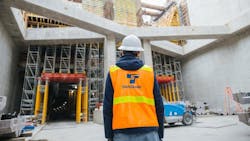Sound Transit adopts hybrid realignment plan to delay delivery of future expansion projects
The Sound Transit Board adopted its realignment plan on Aug. 5, following 17 months of outreach and evaluation. The realignment plan readjusts timelines to deliver most transit projects included in the agency’s ST3 plan by one to 10 or more years. About 40 percent of the projects could see a delay of more than five years with Sound Transit explaining the plan will serve as a framework for delivering future projects.
The realignment was required as Sound Transit faced a $6.5-billion affordability gap to deliver projects on earlier schedules. The agency says the gap is the result of several factors, including a steep rise in real estate and construction costs and advancing environmental review and project designs.
"In the next three years, Sound Transit will nearly triple the length of our light-rail system from 22 to 62 miles," said Sound Transit Board Chair and City of University Place Councilmember Kent Keel. "The realignment plan will guide our work to expedite the next waves of projects, including reaching Tacoma, Everett, West Seattle and Ballard and delivering bus rapid transit and Sounder expansions. These projects are critical for keeping people moving in the face of our population growth and for protecting our economy and environment. To succeed, we will need expanded collaboration at the local, state and national levels."
Projects currently under construction, such as light-rail extensions to Northgate, Lynnwood, Bellevue, Redmond, Federal Way and Tacoma Hilltop, are not included in the realignment plans and Sound Transit notes these projects will be delivered on schedule.
Sound Transit says it is committed to “intensively pursue additional financial capacity and cost reductions” that would deliver some planned projects faster. The plan assigns each project a tier status of one through four with projects in the top two tiers to be managed under more ambitious completion targets unless required revenues are not generated, which would push them back to affordable completion dates.
"The adopted realignment plan shows what is achievable under our current financial projections, but also sets targets for delivering projects sooner by closing the affordability gap that is identified for each project," Keel said. "I am grateful for the leadership of System Expansion Committee Chair Claudia Balducci for working with me in developing this hybrid approach."
Sound Transit said the board is committed to securing additional funding to “eliminate financially necessitated delays altogether.”
Details of the realignment plan, including affordable and target schedules for each project, are available at www.soundtransit.org/realignment.
About the Author

Mischa Wanek-Libman
Group Editorial Director
Mischa Wanek-Libman is director of communications with Transdev North America. She has more than 20 years of experience working in the transportation industry covering construction projects, engineering challenges, transit and rail operations and best practices.
Wanek-Libman has held top editorial positions at freight rail and public transportation business-to-business publications including as editor-in-chief and editorial director of Mass Transit from 2018-2024. She has been recognized for editorial excellence through her individual work, as well as for collaborative content.
She is an active member of the American Public Transportation Association's Marketing and Communications Committee and served 14 years as a Board Observer on the National Railroad Construction and Maintenance Association (NRC) Board of Directors.
She is a graduate of Drake University in Des Moines, Iowa, where she earned a Bachelor of Arts degree in Journalism and Mass Communication.
